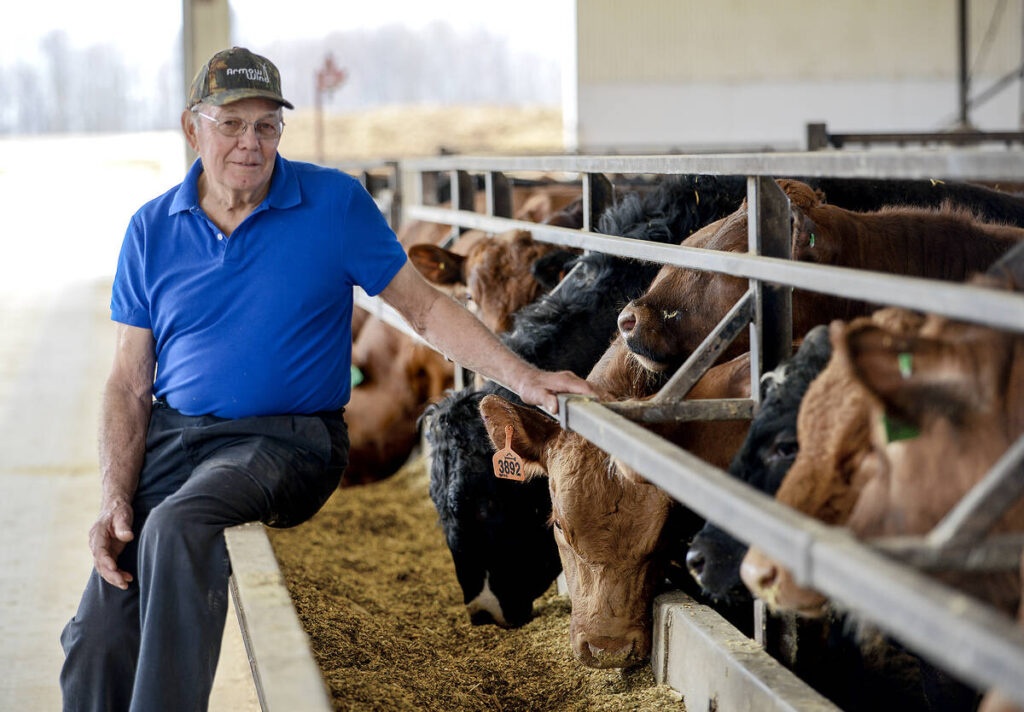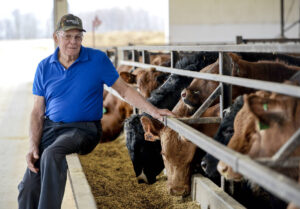
121750 web1 Stan Eby Walkerton01 FTO DM PAPER.jpg
In May 2000, there was no agricultural roadmap to defend against allegations that a beef producer caused the Walkerton water crisis.
Instead, the Ontario Cattlemen’s Association (OCA, now Beef Farmers of Ontario) formed a crisis management team that included newly elected president Stan Eby, assistant manager Mike McMorris and communications manager Kelly Daynard, to craft one to assist Dr. David Biesenthal, an equine veterinarian and beef producer.
Biesenthal was suspected of contaminating Walkerton’s Well 5 with E. coli O157:H7 due to poor manure management practices.
Read Also

‘It still hurts. You never forget.’
Dave and Carolyn Biesenthal reflect on how it felt to be accused of water contamination, the cause of the Walkerton Water Crisis.
Years later, the Walkerton Inquiry would exonerate him, confirming that best practices for manure handling were followed and that the contamination stemmed from 134 mm of rainfall, inadequate chlorination of Well 5, falsified test results, insufficient oversight, and a failure to alert the public.
That wasn’t the case in the days immediately following the public health catastrophe that left seven dead and resulted in over 2000 illness cases.
“Twenty-five years later, we still have sympathy for the families that lost loved ones, and the ones that had long-suffering because of the E coli, and some of them are still suffering from that event,” Eby told Farmtario recently.
Q: Looking back, what do you think organizations could have done differently or better to prepare or assist during the Walkerton water crisis?
Eby: “Thinking back on 25 years ago, we were in new territory. You deal with the facts you’re presented with at the time. You don’t know whether that’s going to turn out right, but you deal with the facts. And have good people around.”
“I don’t see any major things I would change looking back on that,” he added, with the caveat that the multi-government agency gag order was troubling.
McMorris: “Twenty-five years later, you can Google Walkerton, and the Wikipedia that comes up is all incredibly detailed. At the time, there was no Wikipedia, likely, but if there had been Wikipedia, there would be no entry. Nobody knew anything.”

“I think Walkerton was a classic example of a little bit of information that comes out (and) gets reported without context and gets taken as gospel. It was learning, for me, to be very cautious of what you hear and always question what’s the bigger picture? What’s the context? What’s the proof? We all need to be far more skeptical.”
Q: What lessons came from Walkerton for the agriculture or government sectors?
Eby: “Certainly, they (government) tightened up their responsibilities.”
“Are we in better shape than we were in 2000 regarding water issues? Yes, we are, as an agricultural community. Have we solved all the problems? No, but there are less problems and better understanding. I don’t know if Dave mentioned it to you, but the MOE (Ministry of the Environment) were in (at the farm) one time (during the crisis) and said, ‘We put some dye in the water up the stream. You may see that in a couple of days,” said Eby. “Twenty minutes later, it was in the well. It moved that quick.”
Q: What Walkerton lessons apply to future crises or providing factual, trusted information to mainstream media and the general public?
McMorris: “The first thing that pops into my mind is to build and maintain good relationships with other key players.
In most cases, you will be playing a supporting role. Don’t try to be the point person because that’s not the role that you should play. Play a supporting role as needed, and don’t force things on people.”
For example, McMorris said during the Walkerton and BSE crises, calling upon credible experts lent weight and trust to statements.
“Have sound, functional, trusting relationships in place,” he advised. “Ready to be drawn upon.”
“Listen a lot and be very careful about what you say when you say it.”
Be transparent, but don’t make statements that aren’t factual, he clarified.
“Stick to facts. Stick to reason, even though some people might want you to jump into either the black or white pot.”
Lastly, he said Walkerton emphasized the importance of proactively addressing potentially looming issues in advance and distributing the workload wherever possible, as seen in establishing the Environmental Farm Plan (EFP).
“We didn’t talk about mental health in the farm community the way we do today,” McMorris said, questioning if it would have influenced how support was provided. “If everything else was the same, but we had today’s mental health lens 25 years ago? I think it would have played out differently, but I don’t know how.”
Ultimately, charges were laid against brothers Stan and Frank Koebel, the manager and water foreman of the Walkerton Public Utilities Commission. Ontario’s drinking water legislation was overhauled, and Biesenthal used his experience to educate other farmers on the value of EFP record keeping.
Source link
2025-05-22 22:23:40
Karl Hoffman is a distinguished agriculturalist with over four decades of experience in sustainable farming practices. He holds a Ph.D. in Agronomy from Cornell University and has made significant contributions as a professor at Iowa State University. Hoffman’s groundbreaking research on integrated pest management and soil health has revolutionized modern agriculture. As a respected farm journalist, his column “Field Notes with Karl Hoffman” and his blog “The Modern Farmer” provide insightful, practical advice to a global audience. Hoffman’s work with the USDA and the United Nations FAO has enhanced food security worldwide. His awards include the USDA’s Distinguished Service Award and the World Food Prize, reflecting his profound impact on agriculture and sustainability.



